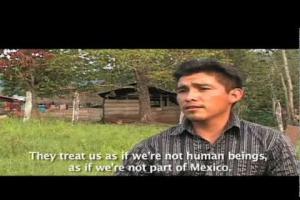In the Democratic Republic of Congo (DRC), Conservation International (CI) is promoting a REDD (Reducing Emissions from Deforestation and Forest Degradation) pilot project financed by the Walt Disney media and entertainment company. The project is being implemented in the Tayna and Kisimba-Ikobo nature reserves, and is one of the first of its kind in the region.
The Green Economy
The Green Economy is a tactic used to “clean up” the image of corporations rather than address corporate capture and capitalism as the true drivers of deforestation. False solutions promoted under the Green Economy include certification, sustainable forest management, ecosystem services, REDD+, the bioeconomy, nature-based climate solutions, and zero net deforestation. Rather than stopping it, these “solutions” support corporate-driven destruction that is causing a deep social and ecological crisis.
Bulletin articles
30 August 2011
Bulletin articles
30 August 2011
In 1999, a number of years before the emergence of REDD, one of the world’s first forest carbon projects was launched. A joint initiative of Brazilian NGO Sociedade de Pesquisa em Vida Selvagem e Educação Ambiental (Society for Wildlife Research and Environmental Education, SPVS) and U.S.-based NGO The Nature Conservancy (TNC), the project is located on the coast of the southern Brazilian state of Paraná, more specifically, in the municipalities of Antonina and Guaraqueçaba.
Bulletin articles
30 July 2011
The capacity of mangroves to store carbon has come to the fore.
Bulletin articles
5 June 2011
In 2009, Rio Tinto, one of the world biggest mining companies, explained how it hoped that it could use REDD, “as an economic tool to offset Rio Tinto’s carbon footprint and to conserve biodiversity”. That, in a nutshell, explains the mining industry’s interest in REDD. Companies hope to continue mining, while investing comparatively small amounts of money in REDD credits to “offset” the destruction.
Bulletin articles
5 June 2011
The Forest Stewardship Council (FSC) was established in 1993 to certify “socially beneficial, economically viable and environmentally appropriate” management of forests. In 1996, the FSC approved the possibility of certification for monoculture tree plantations, a decision that has been the target of harsh and growing criticism, as millions of hectares of plantations have been granted the FSC label (see the editorial in WRM Bulletin 163).
Bulletin articles
5 May 2011
As well as celebrating the International Day for Biological Diversity this month, on May 22, we are also on the eve of another international climate change conference: the 34th session of the Subsidiary Body for Implementation (SBI) and the Subsidiary Body for Scientific and Technological Advice (SBSTA), which are responsible for providing advice and guidance for the implementation of the United Nations Framework Convention on Climate Change. The two bodies will be meeting in Bonn, Germany from June 6 to 16.
Bulletin articles
5 May 2011
After almost five month’s of dithering, Indonesia’s two-year forest moratorium started this month. President Susilo Bambang Yudhoyono faced a choice between two options: one version of the moratorium would have prevented new concession in all forests and peatlands; another version applied only to primary forests and peatlands. Yudhoyono chose the second.
Bulletin articles
30 April 2011
In Mexico, deforestation is advancing at a rapid rate alongside various megaprojects: the expansion of industrial monoculture plantations of oil palm and jatropha for biofuel production, the building of dams, mining concessions, the creation of resettlement centres of prefabricated housing complexes strategically established in locations of resource extraction and land conversion, large-scale tourism development, and highways to facilitate these projects.
Bulletin articles
30 April 2011
“Forest in exhaustion” stems from a controversial proposal by Brazil under the UNFCCC negotiations in Poznan. The interest of Brazil to amend the Clean Development Mechanism (CDM) in order to include “Forests in exhaustion” is that it would allow the CDM to award credits under the Kyoto Protocol for reforestation projects on forest land that has been so over-exploited as to become “exhausted”, and without additional money from the carbon credits would not be replanted. However, it’s not about forests but tree plantations, a main economic activity in Brazil and other Southern countries.
Other information
26 March 2011
Short documentary video by Global Justice Ecology Project
In March, 2011, Global Justice Ecology Project traveled to the village of Amador Hernandez, within the Montes Azules Biosphere Reserve, deep in the Lacandon Jungle of Chiapas, Mexico, to investigate how climate policies such as REDD are impacting the local population. This is what they found...
Other information
5 March 2011
In Buenos Aires, Argentina, on March 22-25, the International Committee for Food Sovereignty-Regional Coordinator for Latin America and the Caribbean (CIP-ALC) organized the Third Special Conference for Food Sovereignty, Rights and Life. The meeting was attended by representatives of social organizations in 20 countries.
Bulletin articles
28 February 2011
For many years now, WRM has stressed that it is unacceptable to certify large-scale industrial monoculture tree plantations. The main target has been the FSC, because it portrays itself to the world as the most reliable and respected label for wood products, and also because its members include numerous non-governmental organizations.

